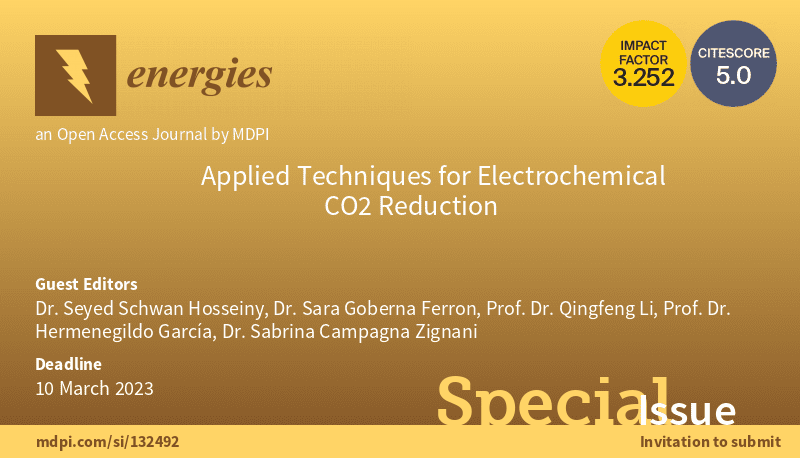We are extremely proud to be selected as guest editors for the special issue “Applied Techniques for Electrochemical CO2 Reduction” of the journal energies (Impact Factor 3.252).

We are looking forward to receiving your high-quality communications, research papers and review articles that address primarily the applied science side of CO2 electrolysis, ranging from electrode and membrane fabrication, long-term studies, full-cell experiments, CO2 electrolysis stack design, and complete CO2 electrolysis systems.
The editorial board of this special issue consist of ECO2Fuel consortium members:
About the special issue:
The reduction in CO2 emissions to prevent severe climate change is one of the most urgent challenges of the 21st century. The electrification of the transport, building, and industry sectors with green, renewable electricity has proven to tackle this human made dilemma effectively. However, some parts of these sectors, such as long-haul applications for freight, marine transport, aviation and some district heat and high heat processes, are not electrifiable and rely on carbon-based fuels.
Furthermore, many industrial products are based on fossils. Apart from biomass, which will always compete with food production, CO2 is a promising green carbon source that can be reconverted to carbon-neutral fuels or chemicals and fed back into a circular economy with no additional CO2 emissions if renewable energy such as wind or solar is used.
Especially, single-step electrochemical CO2 reduction bears great potential to allow economical and efficient production of carbon-neutral fuels and chemicals. However, significant challenges in process efficiency, cell design, electrode fabrication, and long-term operation must be addressed.
Therefore, in this Special Issue, we would like to discuss and report new results and bottlenecks towards applied techniques for single-step electrochemical CO2 reduction. The transition from potential materials on the small lab scale to the fabrication of well-performing systems concerning efficiency, selectivity, and stability will interest the community.
We aim to attract high-quality communications, research papers and review articles that address primarily the applied science side of CO2 electrolysis, ranging from electrode and membrane fabrication, long-term studies, full-cell experiments, CO2 electrolysis stack design, and complete CO2 electrolysis systems.
Click here for further information and to submit.
